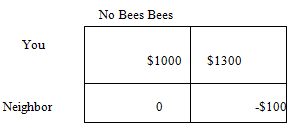Reference no: EM13373449
1. Using a prisoner's dilemma game such as the "wedding game." explain how a positional arms race can occur. In your answer be sure to explain positional arms races, the nature of the wedding game, etc.
2. Joe is the owner of the 7-11 Mini Mart, Sam is the owner of the Super America Mini Mart and together they are the only gas stations in town. At the current price of $3 per gallon both receive total revenues of $1,000. Joe is considering cutting his price to $2.90, which would increase his total revenue to $1,350 if Sam continues to charge $3. If Sam's price remains $3 after Joe cuts his price, Sam will collect $500 in revenues. If Sam cuts his price to $2.90, his total revenues would also rise to $1,350 if Joe continues to charge $3. Joe will collect $500 in revenues if he keeps his price at $3 while Sam lowers his to$2.90. Joe and Sam will receive $900 each in total revenue if they both lower their price to $2.90. You may find it easier to answer the following questions if you fill in the payoff matrix below.

a) Fill out the payoff matrix
b) To Sam, cutting his price to $2.90 is a A. revenue maximizing strategy.
B. dominant strategy.
C. dominated strategy.
D. profit maximizing strategy
c) The clear outcome of this game is that A. Joe will cut his price and Sam won't.
B. both will cut price to $2.90.
C. Sam will cut his price and Joe won't.
D. neither Joe nor Sam will cut their price.
d) To both Joe and Sam, __________ is a __________. A. cutting price to $2.90; disequilibrium.
B. leaving price at $3; Nash equilibrium.
C. leaving price at $3; dominant strategy.
D. cutting price to $2.90; Nash equilibrium.
3. In the "Drilling for Water" game, the final result is the lowering of the water table. Explain how the lack of property rights influences this outcome.
4. You own an apple orchard and raise and sell apples at your own fruit stand. The neighbor next door to your orchard is a beekeeper. She keeps bees to make and sell honey. This year, the neighbor is considering getting rid of her bees because her honey business loses money. If she doesn't raise her bees, your apple production will fall without the bees to pollinate the trees. The following payoff matrix shows the returns to you and your neighbor with and without the bees.

a. If your neighbor makes her decision without considering your orchard, will she keep the bees? Why or why not?
b. Is it socially optimal for your neighbor to keep the bees? Explain.
c. If your neighbor consults with you, will she decide to keep the bees? What would you suggest to your neighbor if she consults you?